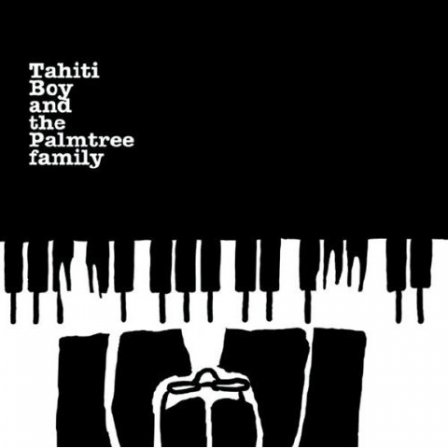Full disclosure: I’ve played the flute for 13 years, and despite the existence of mainstream rock acts like Jethro Tull (stop with the Jethro Tull jokes, already!), I’ve always felt that in my favorite musical genres — punk, art pop, lo-fi — it’s been a seriously underrepresented instrument. It’s just not cool enough, maybe. So when I heard that the first notes of Good Children Go To Heaven, the debut LP from French group Tahiti Boy & The Palmtree Family (a group that, it should be noted, has no tropical tendencies of any kind), were part of a well-performed flute cadenza, I was more than a little excited. Once a band nerd, always a band nerd, I guess. Sorry.
As far as nerding-out goes, though, Tahiti Boy (actually Parisian David Sztanke) makes it pretty clear that I’m not alone. Only a songwriter who attended New York’s Juilliard School as Sztanke did — or at least one who’s got the weight of classical composition and songwriting history behind him — could create an album so widely reverent, technically virtuosic, and pointedly ironic.
That’s exactly what Sztanke and his impressive cast of instrumentalists have done with Good Children…, a record that flits whimsically from 60s- and 70s-rock-inspired jam-outs to Radiohead-reminiscent crooners to cello-driven pointillist jazz plodders. Mostly, The Palmtree Family delivers with careful accuracy (the blindingly bright piano ditty “Sparkle,” the Rhodes and group-sing “When I Miss You,” or the gorgeous duet “Not Only For The Weekend” with Sztanke’s girlfriend Audrey Klébaner), but occasionally the wandering collection of songs devolves into what sounds like an orchestra warming up, all disjointed melodies that create a chaotic symphony of their own (“Andy’s Suite”).
But wherever Tahiti Boy roams stylistically, a lyrical slyness runs throughout, turning what would be straight-up love songs or literal storytelling into weird, oblique tales. “Blood In Your Eyes” refrains, “I never though it’d all go down so fast, killing all your friends until the last,” above angry electric guitar and a beautiful piano étude. And “Who Knows?”, a Thom-Yorke-like, brooding, bare-chested song backed by wobbly cello, features the line “You seem to be the one for me.” Here, the word “seem” illustrates the tentativeness discussed at greater length throughout the rest of the verses: “I want you to see that I want to be the one you need,” Sztanke sings. It’s a minor slow dance tinged heavily with both hope and trepidation. The song blooms temporarily into a retro pop number, an effervescent, piano-driven rock-out (think “Mr. Blue Sky”), because for Tahiti Boy, no one style is quite enough to explore any full thought.
Accordingly, the epic, more than seven-minute “Brooklyn” is something out of a 70s TV show theme song, bopping and sunny. When compared to the musical soundscape, though, the lyrics prove hilariously realist, approaching themes of mortality despite the song’s brightness. Background whistling gives it the air of a Western as the tempo speeds along and the song stretches on, momentum rolling forward like a train on its tracks. At the sixth minute it busts into a kinetic, irresistible jam full of high, moving bass, sprinting keys, and manic drums. I can see the audience’s hair flailing around now. It’s everything you’d get from a jam band concert without all the idiocy and tie-dye.
That’s what makes the septet’s work so intriguing: the wide array of musical prowess offered by the seven band members and their guests (Tunde Adebimpe of TV On The Radio and Sztanke’s former New York cohort appear on “That Song”) offer forays into all kinds of compositional worlds. Even the unadulterated rock numbers have at least one classical element in them under all the pop structure and psychedelia.
Moreover, songs like “Not Only For The Weekend” feature a classical instrumental style that isn’t what’s frequently used in pop (I’m lookin’ at you, Beirut). It’s not populist; they didn’t pull some guy off the street and improvise arrangements, and it doesn’t sound like it. The technique isn’t provincial; the tone is studied and skillful and follows classical standards of performance. Although there’s something inclusive about sweet melodies hacked out on brass or woodwinds, there’s another effect entirely to be had from people who really know their instruments (ones that aren’t guitar, bass, and drums) playing properly. Tahiti Boy & The Palmtree Family, however unintentionally, are working on making nerdiness cool again.
More about: Tahiti Boy & the Palmtree Family

